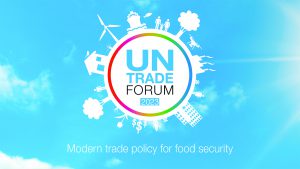GENEVA / WAM
The United Nations Conference on Trade and Development (UNCTAD) will host the third UN Trade Forum on May 8-9 to identify trade policies that can help countries grow their economies while tackling pressing global challenges and accelerating progress towards achieving the UN’s Sustainable Development Goals.
The forum will give particular attention to developing countries, which have been hit hardest by multiple global crises including the Covid-19 pandemic, the war in Ukraine and the climate emergency.
“A cascade of global crises has disrupted international trade, including for essential foods, and revealed the trading system’s vulnerabilities and imbalances,†UNCTAD Deputy Secretary-General Pedro Manuel Moreno said ahead of the forum.
“But trade remains a very powerful engine for sustainable and inclusive growth,†Moreno said.
“And UNCTAD remains committed to providing the data and analysis policymakers need to take informed decisions and ensure trade growth benefits all people and the planet.â€
More than 100 trade experts, policymakers, senior officials from international organisations, business leaders, and civil society representatives will meet in Geneva and online to discuss policies and initiatives that can make trading systems more inclusive, environmentally friendly and resilient.
Topics will include harnessing new opportunities in the ocean economy, promoting trade preferences among developing countries, ensuring that women benefit equally form e-commerce growth, and encouraging businesses and consumers to adopt more sustainable practices.
The forum discussions and report will contribute to upcoming key global events, including the Summit of the Future, the 28th UN climate summit (COP28) and the World Trade Organization’s 13th ministerial conference.
Unlocking an ocean of opportunities
During the two-day event, UNCTAD will launch its Trade and Environment Review 2023. It highlights the vast opportunities our ocean holds for developing countries to recover from the current crises and build more innovative and resilient economies.
The ocean economy – which includes traditional sectors such as fishing and shipping as well as emerging ones like offshore wind energy and marine biotechnology – is already worth between $3 trillion and $6 trillion and provides at least 150 million direct jobs.
But marine resources and the livelihoods they support are under threat from climate change, pollution and overfishing. The forum will identify initiatives and policies that can help developing countries to both exploit and protect the ocean of opportunities.
Promoting trade preferences among developing countries
The potential of the global system of trade preferences (GSTP) among developing countries will also be in the spotlight. Brazil’s recent ratification has rekindled interest in the preferential trade agreement, which will enter into force when one more member ratifies it.
UNCTAD established the GSTP more than three decades ago to help developing countries increase trade among themselves and diversify and add value to their exports. Its 42 members represent a market of more than $16 trillion and 20% of global merchandise imports.
The forum will feature new analysis on how competition and consumer protection policies can help countries encourage businesses and people to adopt more sustainable practices.
And UNCTAD will present a new study looking at e-commerce from a gender and development perspective. Participants will explore the policies needed to guarantee that the benefits of digital technologies and online trade growth reach women as much as men.
 The Gulf Time Newspaper One of the finest business newspapers in the UAE brought to you by our professional writers and editors.
The Gulf Time Newspaper One of the finest business newspapers in the UAE brought to you by our professional writers and editors.
